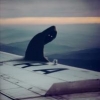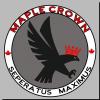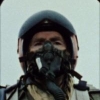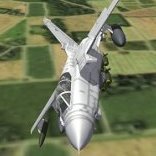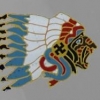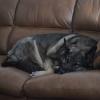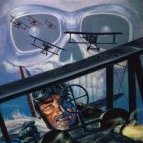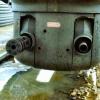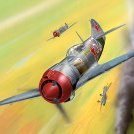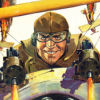Leaderboard
Popular Content
Showing most liked content on 03/20/2018 in Posts
-
7 points
-
6 points
-
3 pointsSukhoi Su-7A "Fitter-A" - Fighter Regiment No.923, Vietnamese People's Air Force, 1965 During the summer of 1953 the newly re-opened Sukhoi OKB began work on a new swept-wing jet fighter. The first prototype, designated S-1, featured a boldly swept-wing of 60° sweep with hydraulically boosted controls and powered by the new Lyulka AL-7 single-spool turbojet fed via a nose intake equipped with a movable inlet cone for managing airflow to the engine at supersonic speeds. First flown on September 7th, 1955 with A. G. Kochetkov at the controls the prototype soon established a Soviet speed record of 1,350 mph (Mach 2.05) in April 1956. The second prototype, designated S-2, introduced some aerodynamic refinements but testing was delayed by an unreliable engine and the unfortunate loss of the S-1 in a crash killing it's pilot I. N. Sokolov in November 1956. Despite this, the first production version (by now designated Su-7A) entered service with the Soviet Air Force in 1958 as a tactical fighter for Frontal Aviation and continued in low-rate production until 1960 with just 132 aircraft built and seeing limited operational use in the Far East from 1958 before being retired in 1965. Meanwhile, the Vietnamese People's Air Force received its first jet fighter aircraft in early 1964 when Fighter Regiment No. 921 was formed flying MiG-17's and they were soon followed by Fighter Regiment No.922 also flying MiG-17's. By the end of 1964, the Vietnamese People's Air Force joined the supersonic club when Fighter Regiment No.923 (led by Lt. Col. Nguyen Phuc Trach) was formed flying Su-7A's transferred from the Soviet Air Force via mainland China and flown by North Vietnamese pilots trained by Chinese advisors. On April 4th, 1965, Su-7A's of the Vietnamese People's Air Force downed two American F-105 Thunderchief's attacking the Thanh Hóa Bridge in a high speed GCI controlled 'hit and run' intercept against a large American air strike group. However, despite this early success, the Su-7A was completely outclassed by American fighters and the dwindling Su-7A force was eventually grounded and re-equipped with the Shenyang J-6 (Chinese-built MiG-19).
-
3 pointsOr they are propaganda items . "Our bombs are wiser than your pilots" etc
-
3 pointsIn SF2, maybe simulated geosynchronous spy satellites?
-
3 points
-
3 points
-
2 points
-
1 pointIn part 2 we continue to look at the Northrop F-20A Tigershark and how its story intertwines with other aircraft programs of the 1980s. Another F-20 is flown The second Pre-production F-20 (82-0063 / GI1001) was flown in August 1983. This configuration included a bigger radome, enlarged canopy, and an up-rated 17,000 lb thrust F404 engine. (Note: The first pre-production jet mentioned in part 1 (82-0062) also received the 17,000 lb thrust engine in 1983.) Also note: “Pre-production” means that Northrop was not going through a Prototype or Full Scale Development (FSD) phase so these aircraft were actually intended to be sold with the F-20 upgrades and changes. F-20 #2 (Northrop Grumman) Let’s get some people on board to really help sell it (F-20 Tigershark Vs F-15) You remember the Light Weight Fighter Mafia right – well they had mostly since left the Pentagon and had reformed as the err “Reformers” (or “Critics” to the USAF), which included John Boyd, Ex USAF Col Everest Riccioni, Pierre Sprey, Chuck Spinney and James Fallows. James Fallows was Washington editor for The Atlantic Monthly.( Described as an anti-military liberal journalist) Fallows had cottoned onto the Reformers in 1979 when researching ideas on how to cut military budgets and had interviewed John Boyd who was still smarting over what was done to the F-16. Fallows was able to gain publicity for the Reformers and their ideas, for example through the best-selling book National Defense in 1981. The Reformers had jumped on the AIMVAL/ACEVAL (Air Intercept Missile Evaluation / Air Combat Evaluation) results in the late 1970s where Red force F-5s had faced off against a blue force of F-15 and F-14s, and the book National Defense was the perfect platform to spin the results. The book took choice cuts from the results carefully omitting information that didn’t fit their agenda and the press went for it, with the Chicago Tribune printing that the F-15 had been “fought to all but a draw” by the F-5 and CBS calling the F-15 a “turkey”. In National Defense reformer Everest Riccioni claimed F-15s couldn’t fly many sorties and so the Air Force actually had a “Phantom fleet”. He then claimed the Air Force could buy 1000 advanced F-5s (The F-20) for the cost of 250 F-15s and generate 10 times more sorties in wartime (2500 v 250). Did I mention that Northrop had hired Everest Riccioni and Pierre Sprey at the time and Riccioni was working on the F-20 program. In reality what had happened in AIMVAL/ACEVAL was that tactics used were not entirely realistic and a lot of it was skewed in favour of the F-5. Despite this the F-15 still had a 2.5 Kill ratio in favour and the AIM-7 (another Reformers target) was responsible of the majority of the simulated kills. From the USAF point of view neither Pierre Sprey or Everest Riccioni had any credibility compared to John Boyd (who had taken a back seat at this stage) and the scraping nails account of this episode suggests this did more harm than good to the F-20 program regarding US support. F-15C - Can you say “it’s a Turkey” in a Pierre Sprey accent? (Airliners.net) What else could have upset the USAF Although a typical sales tactic, Northrop had no real data to back up any claims they were making for the F-20 such as cost, reliability and sortie rate. For example, as RAND point out………. Northrop claims of reliability on the F-20 were pretty much irrelevant. Only 1500 flights in a “test” environment with hand-picked engineers cannot be compared to years of “operational” experience the F-16 had around the world maintained by guys with varied experience in different environments. True cost and sortie rate could never be known as none ever went operational. Some of Northrop’s claims also seemed to stay the same despite airframe and avionics changes that would increase cost. F-20 goes to Top Gun Back in the mid-1970s the USAF were allocated F-5s that never made it to South Vietnam that were wanted because they were very similar in performance and some other aspects to the MiG-21 and so were perfect to use as aggressors at Red Flag. Naturally in 1984 when the US Navy wanted a MiG-29 simulator / aggressor for Top Gun, Northrop seeing a way in offered the F-20A at a low price with its promise of lower operating costs. Senator Pete Wilson had managed to get money through congress in the hope the F-20 was selected. General Dynamics also offered the F-16N (F-16C Block 30 with gun replaced by ballast) for a very low £11m each which was the same unit price as the F-20. The USN went with the F-16 which they believed to be a better simulator for 4th Gen threats…and it probably was being a bit larger with superior performance, also high-tech avionics were not required, in fact they stuck in the basic APG-66 radar from the A model. The USN literally got steal of the century on unit cost here…………. or they would have done if someone at the Navy hadn’t specified titanium wing attachment brackets without testing them (another story). F-16N (Lockheed Martin) Another F-20A flies The third pre-production F-20 (82-0064 / GI1002) first flew on May 12 1984 and was similar to 82-0063 / GI1001 in configuration it seems. F-20 Pre-production figures from Flight Manual F-20 #3 (Northrop Grumman) Tragedy befalls Northrop and the program On the 10th October 1984 the first pre-production F-20 (82-0062) crashed at Suwon Air Base in Korea killing pilot Darrell Cornell. Cornell had apparently succumbed to G-LOC after a 9G pull up as part of practicing an established demonstration routine with the aircraft appearing unresponsive after the maneuver. The Northrop F-18L and McAir All this time Northrop had been having a handbag face slapping argument with McDonnell Douglas (McAir). In October 1979, Northrop filled a $700 million antitrust suit against McAir. Northrop had developed the YF-17 for the Light Weight Fighter (LWF) competition in 1974 and this was later developed into the FA-18 carrier-based fighter under some kind of teaming agreement. Under this agreement McAir as prime contractor would build 60% of the carrier capable FA-18 and Northrop would build 40%. For the land-based F-18L Northrop were prime contractor building 60% and McAir building 40%. The Northrop F-18L was what might have been if the YF-17 had won in 74. Without all the extra weight needed for carrier ops and a totally different 9G structure it was over 2500 lbs lighter with a top end of M2.0 and was initially specified with a hard wing losing 3000 lbs of fuel reducing its range. Northrop basically had accused McAir of trying to monopolize the business and basically interfering with the F-18Ls chances of success in the export market by launching active sales efforts for the FA-18 to potential customers when they showed interest in the F-18L. Another suit also claimed McAir was unfairly using Northrop technology from the F-18L to sell its own FA-18. McAir then counter-sued against Northrop, claiming that the Northrop F-20 avionics had been taken from the McAir FA-18……. The suit was finally settled by April 1985……. which meant McDonnell Douglas would pay Northrop $50 million and become the prime/sole contractor for all FA-18s including export sales, and thus the F-18L was never heard from again………….. The F-18L - another unloved Light Weight Fighter devoid of orders (Northrop Grumman) F-16C v F-20A merge head on In April 1985 to try and finally get some sales from the US Government, Northrop offered 396 F-20s to replace current F-16C production at a fixed price of $15 million, undercutting the F-16C fixed price of $18 million. General Dynamics hit back with a 720-plane proposal for stripped down F-16s at $13.5 million each with cheaper avionics. These were apparently jokingly referred to as the “F-16C-minus”. This clearly came to nothing. F-20 #3 again (Northrop Grumman) Another Tragedy On the 14th May 1985 at Goose Bay, Canada the second pre-production F-20 (82-0063 / GI1001) crashed in a similar manner to the first killing Dave Barnes. Barnes was incapacitated during or after a 9G pull up as part of the demonstration being practised for the Paris air show. With no flight recorder on board the enquiry attributed this again to G-LOC and possibly a result of reduced G tolerance after flying four high G demonstration flights that day. The Air Defense Fighter (ADF) competition In 1986 the US Air Force (as ordered by Congress) held a competition for 270 mainland Interceptors for the defense of the Continental US. Both the F-20 and F-16 were contenders, and good point defense fighters despite the reservations of some. Sadly, again the F-20 was not favoured for a few reasons: · The F-20 was not in production so the costs couldn’t be guaranteed The cost to operate and maintain it would be higher than Northrop had claimed. In the end neither the General Dynamics or the Northrop proposal were selected by the Air Force, instead it was decided to take 270 F-16A Block 15s in service from the Air National Guard (ANG) and modify them to an ADF and OCU (Operational Capability Upgrade) standard, with: A higher thrust F100-PW-220 engine Capability to use bigger 600 US Gal drop tanks An Advanced IFF interrogator An upgraded APG-66 (V) 1 radar with increased range, small target capability and the capability to fire AIM-120 and AIM-7. F-16 A Air Defense Fighters (USAF) Making the F-20 better (The fourth Pre-production jet) Interestingly by the 1986 ADF competition there had been changes to the F-20 to increase range and deal with carriage of AIM-7s with proposals to: Increase internal fuel to 5050 lbs by replacing the fuselage bladder with integral fuel tanks. Increase external drop tank size. Increase thrust of the F404 to 18000 lbs to offset the extra weight and drag. New Electromagnetic Maneuvering flaps. Fly By Wire control system with backup Hydromechanical controls (similar to FA-18) Northrop & GE were also working on an upgraded APG-67 radar with enhanced range. This was proposed by putting a bigger antenna on it and moving it back in the nose. Luckily, they also intended to replace the obsolete M39s with a single modern gun to make some room for the radar move. This is said to have been planned for the fourth Pre-Production aircraft (82-0065/ GI1003) but was only 25% compete when cancelled. This remained a paper airplane but nonetheless a valiant effort to reduce some of the performance deficiencies. Of course, the glaring problem here is that by making these changes the cost and complexity increases, reducing its advertised selling points and ending up with a jet that offers nothing significant over the F-16 and FA-18…………and unfortunately the US was still not interested in buying it. The end Northrop closed the F-20 program at the end of 1986 at the cost of around $1.2 billion……… it just was not meant to be with everything against it. However, despite the loss Northrop were still doing okay out of the FA-18, ATF (YF-23) and B-2 programs at that time. No conciliation to them but perhaps an example of how competition can sometimes benefit US services by keeping cost down. Summary of the F-5G/F-20A Pre-Production Aircraft F-20A on Display at the California Science Center https://californiasciencecenter.org/exhibits/air-space/air-aircraft/f-20-tigershark Sources F-20A Utility Flight Manual (NTM 1F-20A-1) for GI1001 & GI1002, Jan 1984 (Northrop) Northrop F-5G/F20A Tigershark (Baugher J ) 2000 online at http://www.joebaugher.com/usaf_fighters/f5_51.html A Case study of the F-20 Tigershark (Martin, Schmidt) 1987, RAND Corporation The Reformers (Correll JT), Feb 2008 Air Force Magazine. P40-44 The Revolt of the Majors How the Air Force changed after Vietnam (Michell III, ML) Auburn University Sierra Hotel: Flying Air Force fighters in the decade after Vietnam. (Anderegg CR) 2001 Air Force History and Museums Program Boyd (Coram R) 2002, Back Bay Books F-20A Tigershark (Wade, M) 2007 online at http://www.thecid.com/f20a/index.html F-16.net online at http://www.f-16.net/ Code One Magazine (General Dynamics) Northrop F-18L (Baugher J), 2000 online at http://www.joebaugher.com/navy_fighters/f18_9.html Huge Lawsuit settled, ( AP News archive) 1985, online at http://www.apnewsarchive.com/1985/Huge-Lawsuit-Settled/id-cca766d9766ec7f4d1aa29c5ca5db7cb The Land Based F-18L, Flight International December 1978 p2034-2035 Title Photos for Part 1 and Part 2 from Northrop Grumman
-
1 pointHello, I have a question about the "ground object role" function in SF2. Do you think the GroundObjectRole=BALLOON exist ? First Eagle 2 gives us this entry. Thanks for advance, Coupi.
-
1 point
-
This post cannot be displayed because it is in a password protected forum. Enter Password
-
1 pointI have these F-101 manuals and documents if you want them. F-101A Phase II Flight Evaluation (September, 1955) T.O. 1F-101(R)A-1 (15 December, 1958) T.O. 1F-101B-1 (15 July, 1963) T.O. 1-1c-1-11 (1 August, 1966, Changed 25 July, 1969) F/RF-101 Flight Crew Air Refuling Proceduers with KC-97L, KC-135 Supplement XI T.O. 1F-101(R)G-1 (1 March, 1971; Change 1, 15 June, 1971)
-
1 pointDoes it happen with stock or custom aircraft? AFAIK there is a "bug" where orders given to custom, user-flyable heavy bombers can cause a crash to desktop. SF2 was not intended to be used to fly with heavy bombers, so I always leave those to the AI.
-
1 pointBarrage balloons if SF2 WW2 that you could actually collide with?
-
This post cannot be displayed because it is in a password protected forum. Enter Password
-
1 pointwhat actually ballons do? exept falling down from the sky...
-
1 pointFunny you should ask that. I was just recently messing around with my own long term F-101 FM which uses a pitch up effect. If you have the original FM you probably want to check the StallMoment=whatever entry for the inner and outer wing panels. They are typically in the 0.000 to -0.002 range. To generate a pitch up, you can bump the numbers up to something considerably higher. I was using StallMoment=0.08 on the inner [forward] wing panel and StallMoment=0.000 on the outer wing panel which gave an interesting pitch up effect. I was on the verge of doing an informal release of my RF-101 FM but decided to re-think the whole pitch up issue. The effect is just a simplified work around and doesn't really reflect the actual aerodynamics of the VooDoo pitch up, plus the Voodoo had roll and pitch limiting systems as well as a stick pusher to avoid pitch up so it might actually make more sense to try and simulate a stick pusher effect, with a large nose down [negative] StallMoment. Unfortunately, from past experience with the F-104, I've never been able to get a convincing stick pusher effect.
-
1 pointNot only FE2 but also FE1 or FEG. e.g. Look here: "TypeAe_Data.ini" [MissionData] NationName=GERMANY ServiceStartDate=1917 ServiceEndDate=11/11/1918 GroundObjectRole=BALLOON Availability=COMMON Exported=TRUE ExportStartYear=1916 ExportAvailability=COMMON (This isn't very important information but I told it just in case).
-
1 pointThanks VonS,,,I've got the base FE2 up and running great..Tomorrow I'l grab some terrains and try them out..When I start putting mods in sims I always make a quick backup before so if something goes amiss I have a fallback install,,Actually I have both FE 1 and 2 installed..Got to do some reading here so I can tweak it a bit
-
1 pointShould work fine, I run several of the older aircraft made for FE/FEgold in FE2 without any problems, as Geezer indicated. Main thing is to double-check your decals.ini file located in the skin folder of an aircraft's folder (might require some tinkering with file pathways in the decals.ini file for decals to show up properly, but otherwise there haven't been any problems from what I've been able to see on my rig). Good luck with getting FE2 up and running - you'll find it a great improvement over RB3D. Von S
-
1 pointThe answer is yes.....probably. There is little differentiation between FE and FE2, like in Strike Fighters. Having said that, understand some of the earliest mods (aircraft, effects, etc) may have problems running in FE2 because of changes to the code over time. VonS runs most all aircraft, old or new, in FE2 and gets them to work. Good luck!
-
1 pointGround objects affect variety of the friendly and enemy units that can spawn. Terrain's enemy nations are limited to just Libya, hence why you might have the same objects spawning. Unfortunately, many ground objects lack a _userlist.ini file listing all the “real life” user nations for said ship or tank or whatever. I suggest that you download eburger68's ground object packages (SF2 SAM Pack, SF2 AAA Pack, SF2 Tanks Pack, etc.) as they include various fixes. Apart from that, I think nothing's wrong with your configuration. I usually get the same objects spawning because of the reason above.
-
1 point
-
1 point
-
1 pointYakarov, please tell me those are brand new Hueys!! Mandatory screen, packed mini carrier...
-
1 point
-
1 point
-
1 point
-
1 point
-
1 point
-
1 point
-
1 pointWho needs two tails? Using the F-15SE's stealth features to go AWACs hunting:
Important Information
By using this site, you agree to our Terms of Use, Privacy Policy, and We have placed cookies on your device to help make this website better. You can adjust your cookie settings, otherwise we'll assume you're okay to continue..

